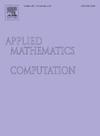Spatial public goods games with queueing and reputation
IF 3.5
2区 数学
Q1 MATHEMATICS, APPLIED
引用次数: 0
Abstract
In real-world social and economic systems, the provisioning of public goods generally entails continuous interactions among individuals, with decisions to cooperate or defect being influenced by dynamic factors such as timing, resource availability, and the duration of engagement. However, the traditional public goods game ignores the asynchrony of the strategy adopted by players in the game. To address this problem, we propose a spatial public goods game that integrates an queueing system to simulate the dynamic flow of player interactions. We use a birth-death process to characterize the stochastic dynamics of this queueing system, with players arriving following a Poisson process and service times being exponentially distributed under a first-come-first-served basis with finite queue capacity. We also incorporate reputation so that players who have cooperated in the past are more likely to be chosen for future interactions. Our research shows that a high arrival rate, low service rate, and the reputation mechanism jointly facilitate the emergence of cooperative individuals in the network, which thus provides an interesting and new perspective for the provisioning of public goods.
具有排队和声誉的空间公共物品博弈
在现实世界的社会和经济系统中,公共产品的提供通常需要个人之间的持续互动,合作或背叛的决定受到诸如时间、资源可用性和参与持续时间等动态因素的影响。然而,传统的公共物品博弈忽略了博弈参与者所采取策略的非同步性。为了解决这个问题,我们提出了一个空间公共物品游戏,该游戏集成了一个M/M/1排队系统来模拟玩家互动的动态流程。我们使用出生-死亡过程来描述该排队系统的随机动力学,玩家遵循泊松过程到达,服务时间在有限队列容量的先到先服务的基础上呈指数分布。我们还结合了声誉,这样过去合作过的玩家就更有可能被选中参与未来的互动。我们的研究表明,高到达率、低服务率和声誉机制共同促进了网络中合作个体的出现,从而为公共物品的供给提供了一个有趣的新视角。
本文章由计算机程序翻译,如有差异,请以英文原文为准。
求助全文
约1分钟内获得全文
求助全文
来源期刊
CiteScore
7.90
自引率
10.00%
发文量
755
审稿时长
36 days
期刊介绍:
Applied Mathematics and Computation addresses work at the interface between applied mathematics, numerical computation, and applications of systems – oriented ideas to the physical, biological, social, and behavioral sciences, and emphasizes papers of a computational nature focusing on new algorithms, their analysis and numerical results.
In addition to presenting research papers, Applied Mathematics and Computation publishes review articles and single–topics issues.

 求助内容:
求助内容: 应助结果提醒方式:
应助结果提醒方式:


